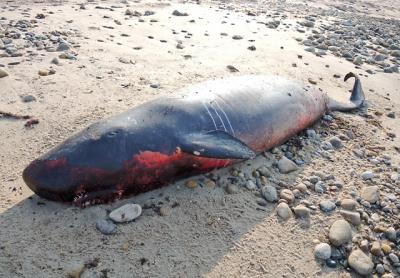Nature Notes: Oh, the Humanity?

Humans are mammals. We Homo sapiens can carry on conversations in hundreds of different languages, keep legible diaries, write histories, sing, act, take tests, practice various vocations, go to schools and universities, indulge in marriage ceremonies and funerals. We are complicated and talented mammals, but in the final analysis, mammals.
Yet we are one of the few mammals that engages in combat. To a much lesser degree, one of our close relatives, the chimpanzee, will fight fellows of its species to the death, as will a few others, including the male African lion, which is known to kill and eat cubs that are not his own. But all other members of the class Mammalia, do not engage in mass killing of each other in the name of conquering or defending. In the first sense, we are the most advanced and most intellectual of all mammals when dealing with each other; in the second sense, the dumbest and cruelest.
Another thing almost unique to humans is suicide. Very few mammal species take their own lives, save the lemmings and hoofed species that are known to follow the leader over cliffs to their deaths. It is still unproven, but some believe that whales commit suicide. Not all strandings or “beachings,” of whales are suicidal, but some are believed to be. Some whales are mass beachers: The stranding of 1,000 or so pilot whales in 1918 comes to mind, or the beaching of 450 pilot whales in New Zealand in 1985. Some readers may remember the dolphins that for some reason entered Northwest Creek, an arm of Northwest Harbor, in the early 2000s, only to mostly perish despite several days of efforts to get them to deeper water and save them.
We couldn’t talk to them, so we will never really know why they did it. Some cetaceans, such as baleen whales, are more solitary, but occasionally also beach and die. It’s puzzling why six humpback whales, all loners, have beached and died on Long Island since 2017. The Cuvier’s beaked whale is a solitary species that frequently beaches and some of these beachings are tied to naval sonar use. But if not suicide, why do so many beaching rescues end up with the creatures ultimately beaching again?
Suicides in America are on the rise again after a momentary hiatus. At last count there were some 45,000 deaths from suicide every year in the United States. Yet for every successful suicide, there are about 25,000 attempts that are thwarted.
Murder is also on the rise across the world. While male lions sometimes eat cubs and chimps kill other chimps in raids, even if such are counted as murders, the rate is many, many times less than in humans. In India, Central America, Mexico, and many Caribbean countries, murder rates are very high. In Scandinavia, England, and other European countries, they are very low.
Wars are another source of the loss of life. More than 35 million civilians and military personnel died in World War II, as many as 44 million in the internecine Taiping war of China in 1844. At last count there were more than 7.5 billion humans worldwide; 44 million is less than a half a percentage point of the world total, but losses from wars, suicides, highway deaths, murders, diseases, and other health problems add up, and the birth rate worldwide is dropping. We may see a death rate that equals the birth rate by the end of the century, and, thus, a stable world population.
Humans, perhaps rodents such as rats, as well as dogs and cats, may be increasing in numbers while almost all of the other vertebrates are either decreasing or have very low numbers to begin with. We have yet to see the havoc wrought by too many people, but we may be on that verge. It goes without saying that we should stop fighting with each other, stop competing with each other when it leads to more have-nots than haves, stop killing ourselves, and continue to progress in medicine, education, and economics.
It’s been at least 3,000 years since Moses came down from Mount Sinai with the 10 commandments in tow, but they are still as good as any codes contrived today. The handwriting is on the wall, the question is, “Can we read it?”
Larry Penny can be reached via email at [email protected].
